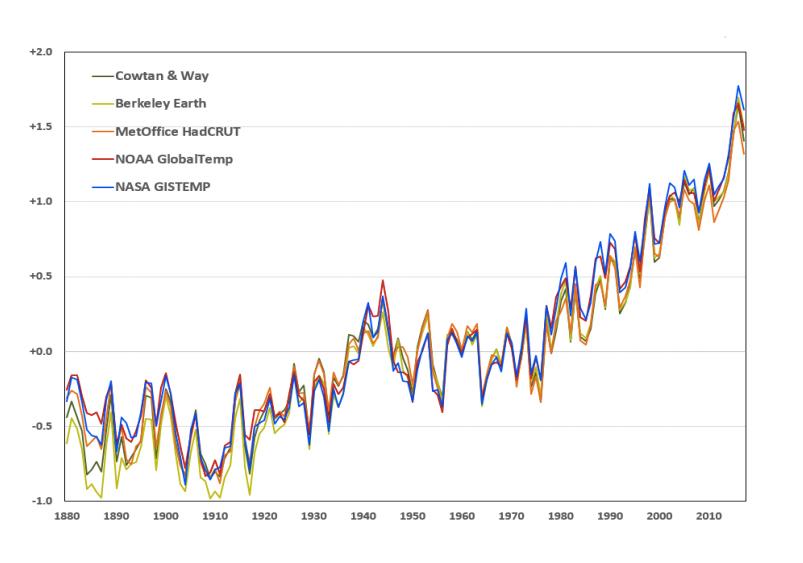A reflection on the dichotomy of climate change
Courtesy of NASA
There are many headlines claiming that 2020 is the last year before we can no longer reverse climate change, a statement often followed by saying that in 50 years the Earth will be uninhabitable.
On the other hand, there are also headlines that say climate change is a hoax or inaccurate.
What can be done about these opposing points of view?
First, we need to look at the evidence regarding global temperatures to see if there is really a threat.
The U.K.’s national weather service, the Met Office, recently released data showing that global surface temperatures have not changed between 1998 and 2012.
Many climate change deniers like to use that statistic to prove their claims. However, once you start looking at data from 10 or 20 years before 1998, it becomes clear that temperatures are increasing.
The graph above from NASA shows the rise in global temperatures for over 130 years.
We don’t have any more resources than what is already on our planet. We can’t make more oil, natural gas, coal and other nonrenewable energy sources. We can’t make more water. We only have so much space for garbage dumps. We can only work the land the way we do now for so much longer. We can’t afford to waste the resources we have.
Why do over 30 percent of Americans deny climate change, and why do 50 percent believe it won’t be a danger in their lifetime?
At one of the breakout sessions during the Day of Common Learning, I listened to Joshua Tom and Jennifer McKinney, both professors of sociology, talk about the evangelical’s relationship with the environment.
During the session, a study from the Public Religion Research Institute was brought up which showed white evangelicals as the demographic most likely to believe natural disasters are the results of “the end times,” and are least likely to believe they are the cause of global climate change.
This division, essentially a culture war, created a schism between those who were white evangelical Christians and those who believed in the science of destructive climate change.
It is now perceived as a political agenda, spread by misinformation and political bias, for evangelicals to rally against, and it spurred an “oppositional attitude” toward the scientific consensus.
If you’re a Christian, you should care about the environment because, as Dr. A.J. Swoboda said during the keynote address last week, “Caring for the planet is rooted in scripture from day one.” We have been called to take care of the Earth, and we should, because God made the land and everything on it, and that should be honored.
If you aren’t a Christian, you should still care about the environment. It’s the only one we have. Future generations need to live here, and if the air is so polluted that they can’t breathe, we will have failed them.
The idea that we can do no harm to the environment because God wouldn’t have created it that way is dangerous.
The idea that we don’t need to save our planet, our only planet, because we’re going to die anyway is dangerous.
Big corporations need to realize this as well.
In 2017, the Carbon Majors Database released a report showing that a relatively small number of producers of carbon emissions are creating the majority of the greenhouse gases.
The report shows 100 companies are responsible for 71 percent of greenhouse gas emissions. This is important if the issue of rising global temperatures is to be tackled — there isn’t much a single person can do by recycling, if oil and gas companies continue to increase their carbon output.
However, there is some good news.
Over 150 companies, including Facebook, Coca Cola, Nike and Apple, have signed on with RE100, a global initiative focused on renewable power lead by the Climate Group, and are committed to switching their businesses to going “100 percent renewable.”
There isn’t a date by which they need to make the switch, but it is a promising start.
Climate change is a problem that affects everyone, and it is a problem that we need to work together to solve.
The first step is realizing that we need to care for our planet so we can begin working together.
We till the soil to sustain our bodies, so we should protect the Earth from destruction. All people, regardless of what they believe in, should unite under the common cause of stewarding the Earth.
















































































